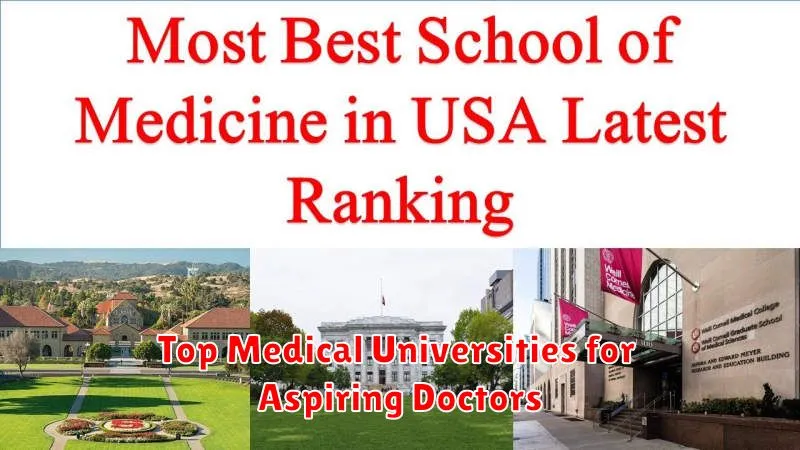Aspiring to be a doctor requires dedication, perseverance, and above all, a top-tier education. Choosing the right medical university is a crucial step in this journey. This article explores the top medical universities worldwide, providing insights into their programs, research opportunities, and overall academic excellence. We will examine what distinguishes these institutions as leaders in medical education, helping you navigate the complex process of selecting the best environment to pursue your dream of becoming a doctor.
Earning a medical degree is a significant commitment, and selecting a medical university that aligns with your career goals is paramount. Whether you’re interested in groundbreaking research, specialized medical programs, or a particular clinical setting, understanding the strengths of different top medical universities is essential. This guide delves into the key factors that contribute to the prestige and success of these leading institutions, providing valuable information for aspiring doctors like you.
Why Medical Schools Differ Globally
Medical education varies significantly across the globe due to a multitude of factors. Curriculum design is a key differentiator. Some programs emphasize a traditional, lecture-based approach, while others adopt problem-based learning or integrated curricula. The clinical exposure offered also fluctuates, with some schools providing early and extensive patient interaction while others focus more on theoretical knowledge in the initial years.
Admission requirements are another point of divergence. Different countries and even individual institutions have unique prerequisites, ranging from specific high school courses to entrance exams like the MCAT or UCAT. The length of medical programs also varies considerably, spanning from five to seven years or even longer depending on specialization.
Furthermore, the regulatory environment plays a crucial role in shaping medical education. Accreditation standards, licensing procedures, and the overall structure of healthcare systems all influence how medical schools operate and the competencies they prioritize in their graduates.
Requirements to Study Medicine Abroad
Embarking on a medical education abroad requires careful planning and fulfilling specific prerequisites. Academic qualifications are paramount. Most universities require a strong high school background with a focus on science subjects like biology, chemistry, and physics. Some institutions may require specific standardized tests such as the MCAT (Medical College Admission Test) or equivalent exams.
Language proficiency is crucial, especially in countries where the language of instruction is not your native language. Proof of proficiency through tests like TOEFL or IELTS is often mandatory. Additionally, some programs may require specific subject-based language tests.
Visa requirements vary by country. Students must ensure they have the correct student visa and meet all the associated criteria. This typically includes proof of acceptance into a recognized medical program, financial stability to cover tuition and living expenses, and a clean criminal record.
Beyond these basic requirements, individual universities may have additional prerequisites, including interviews, entrance exams, or specific pre-medical coursework. Thorough research and direct contact with the target institutions are strongly recommended.
Harvard Medical School
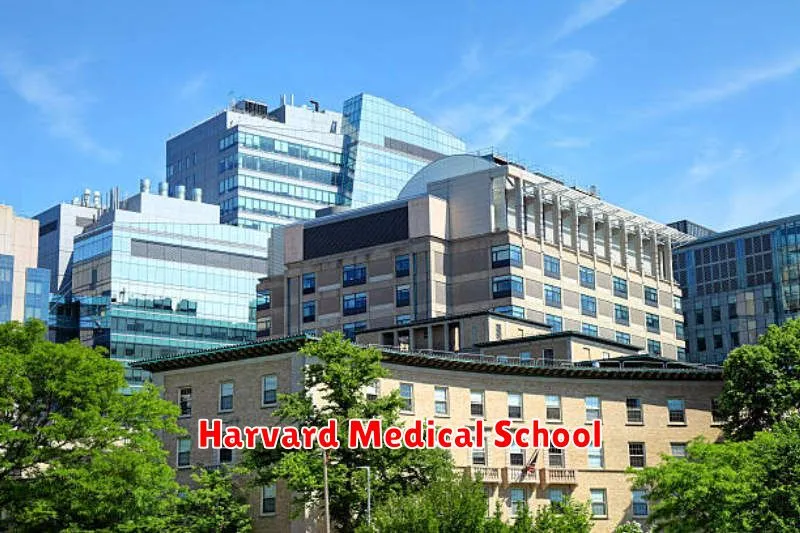
Harvard Medical School (HMS), established in 1782, consistently ranks among the top medical schools globally. Located in Boston, Massachusetts, HMS is renowned for its pioneering research, exceptional faculty, and rigorous curriculum. It offers a variety of programs, including the MD program, PhD programs in biomedical sciences, and master’s degrees in areas such as public health and medical sciences.
Students benefit from a highly competitive learning environment and access to state-of-the-art facilities. HMS is affiliated with several prominent hospitals, providing students with unparalleled clinical experience and exposure to diverse patient populations.
Key Features:
- Strong emphasis on research: HMS fosters a culture of inquiry and innovation, encouraging students to actively participate in groundbreaking research projects.
- Distinguished faculty: Students learn from world-renowned experts and leaders in their respective fields.
- Extensive clinical opportunities: Partnerships with top-tier hospitals offer hands-on experience and exposure to diverse medical specialties.
University of Oxford Medical Sciences
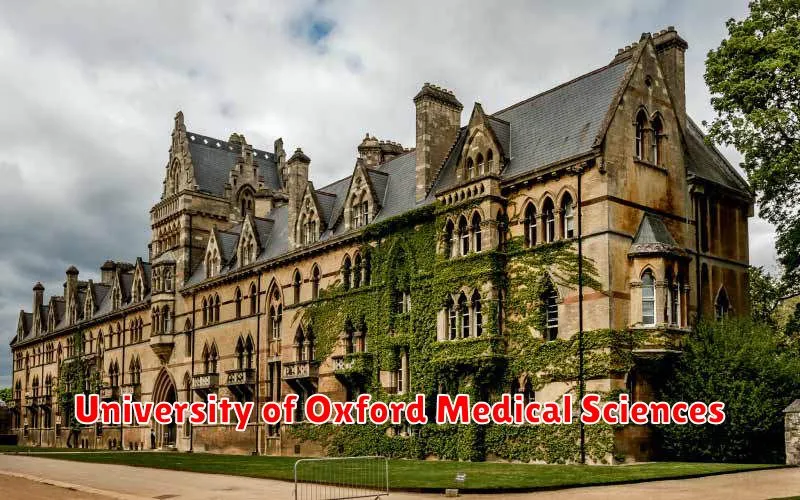
The University of Oxford offers a rigorous and prestigious medical program, consistently ranked among the best in the world. The six-year BM BCh degree integrates pre-clinical and clinical studies, providing students with a comprehensive understanding of medical science and practice.
Key Features:
- Tutorial System: Oxford’s renowned tutorial system allows for personalized learning and in-depth discussions with leading academics.
- Research Focus: The program strongly emphasizes research, encouraging students to engage in scientific inquiry and contribute to medical advancements.
- World-class Facilities: Students have access to state-of-the-art laboratories, libraries, and clinical resources.
- Clinical Experience: Extensive clinical placements in diverse healthcare settings provide practical experience and patient interaction.
Admissions: Admission to Oxford Medical Sciences is highly competitive, requiring strong academic credentials, including high A-level grades or equivalent, as well as a demonstrated passion for medicine and research.
Johns Hopkins University School of Medicine
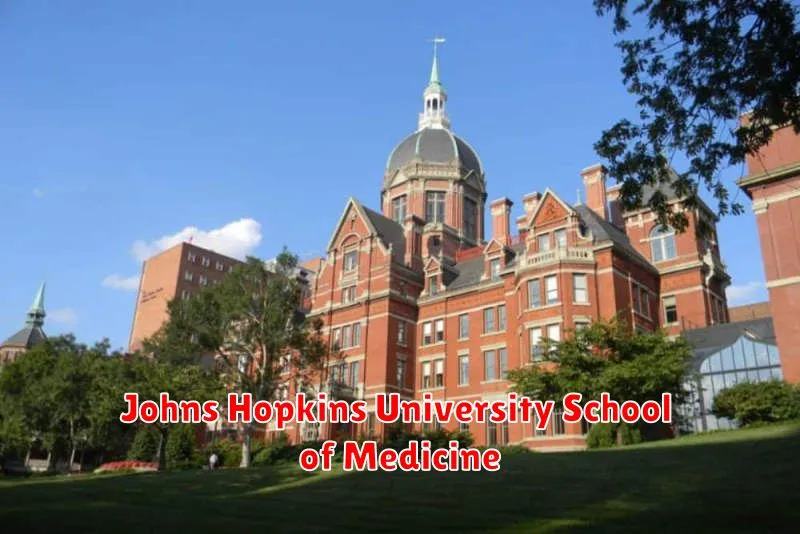
The Johns Hopkins University School of Medicine consistently ranks among the top medical schools in the United States. Known for its pioneering research and exceptional clinical training, it offers aspiring doctors a rigorous and comprehensive education.
Key strengths of the program include its emphasis on integrating research and clinical practice, fostering innovation in patient care, and providing diverse clinical experiences across the Johns Hopkins Health System.
Students benefit from a distinguished faculty composed of leading researchers and clinicians who are at the forefront of their fields. The curriculum emphasizes a patient-centered approach, equipping students with the knowledge, skills, and ethical principles necessary to become compassionate and competent physicians.
Areas of particular excellence at Johns Hopkins include genetics, immunology, neuroscience, and public health, providing numerous opportunities for students to pursue specialized training and research interests.
Karolinska Institute, Sweden

The Karolinska Institute (KI) is a world-renowned medical university located in Stockholm, Sweden. Consistently ranked among the top medical schools globally, KI offers a rigorous and research-intensive environment for aspiring doctors.
KI is renowned for its prominent role in selecting the Nobel Laureate in Physiology or Medicine. The Nobel Assembly at Karolinska Institutet, composed of fifty professors from KI, evaluates nominations and selects the recipient, highlighting the university’s significant influence in the medical field.
Students at KI benefit from a strong emphasis on research and a curriculum focused on translational medicine, bridging the gap between scientific discovery and clinical application. The university offers a range of programs, including a globally recognized medical program.
Furthermore, KI boasts state-of-the-art facilities and fosters a collaborative environment where students interact with leading researchers and clinicians. This provides an invaluable opportunity for aspiring doctors to gain practical experience and contribute to cutting-edge medical advancements.
University of Cambridge School of Clinical Medicine
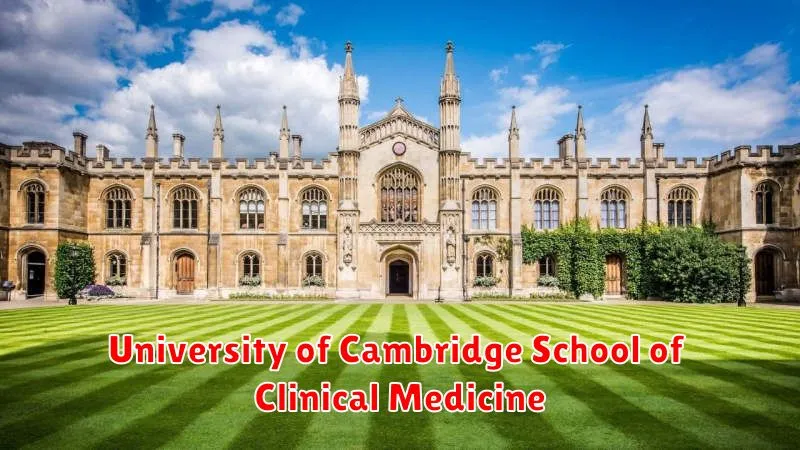
The University of Cambridge School of Clinical Medicine holds a prestigious position among global medical institutions. It offers a rigorous and comprehensive medical education, emphasizing both theoretical knowledge and practical clinical experience. Students benefit from the university’s extensive research facilities and its close ties with leading hospitals.
The curriculum integrates scientific principles with patient-centered care. Students engage in hands-on learning through clinical placements and simulated scenarios. The program also fosters critical thinking and problem-solving skills, preparing graduates for the complexities of modern medical practice.
Admission to the University of Cambridge School of Clinical Medicine is highly competitive, requiring exceptional academic achievement and a demonstrated passion for medicine. The school seeks candidates who possess intellectual curiosity, a strong work ethic, and a commitment to serving others.
Stanford University School of Medicine
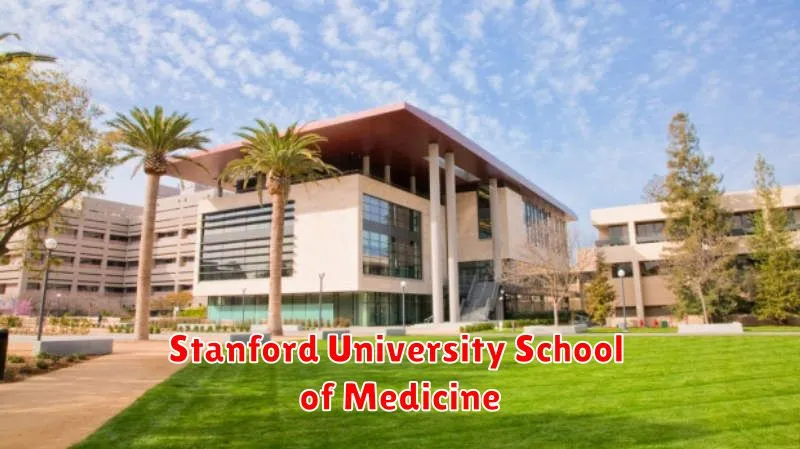
Located in the heart of Silicon Valley, Stanford University School of Medicine consistently ranks among the top medical schools in the United States. It is renowned for its pioneering research, innovative curriculum, and commitment to patient care.
Key strengths include its integration of biomedical research with clinical medicine, fostering a collaborative environment that translates scientific discoveries into tangible advancements in patient health. The school’s emphasis on personalized medicine and biomedical informatics prepares future physicians for the evolving landscape of healthcare.
Stanford also boasts a diverse student body and faculty, fostering a rich learning environment. Its proximity to leading technology companies and research institutions offers unparalleled opportunities for collaboration and innovation.
University of Melbourne
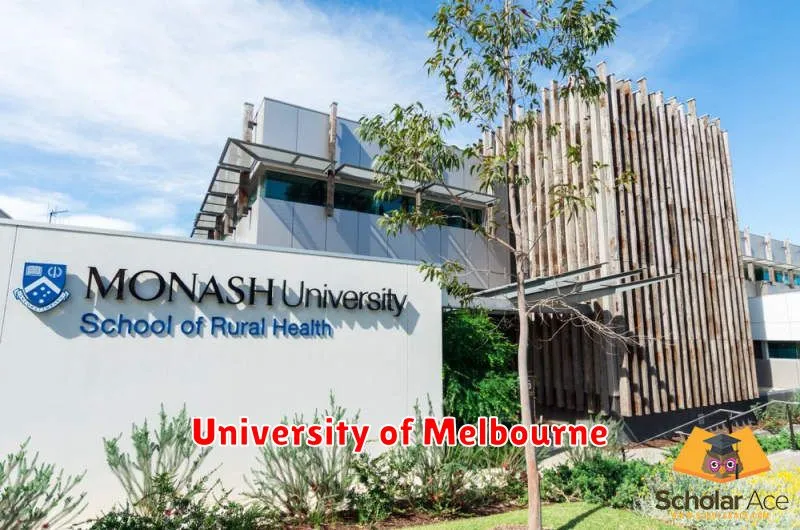
The University of Melbourne, located in Melbourne, Australia, consistently ranks among the top medical schools globally. It offers a Doctor of Medicine (MD) program, a graduate-entry professional degree.
The MD curriculum emphasizes clinical practice, research, and population health. Students gain experience in diverse healthcare settings and engage in research projects throughout their studies. The university’s strong ties with affiliated hospitals and research institutes provide valuable opportunities for students.
Admission to the MD program is highly competitive and requires a strong academic record, including a bachelor’s degree and a satisfactory score on the Graduate Medical School Admissions Test (GAMSAT). Shortlisted applicants are also assessed through interviews.
University of Toronto
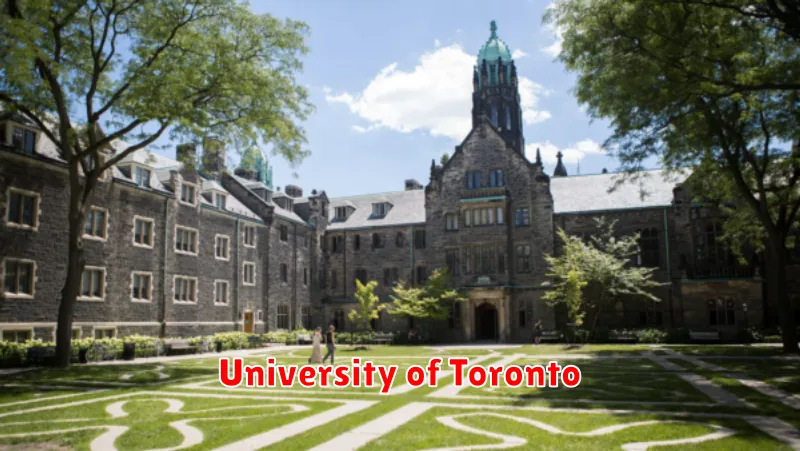
The University of Toronto consistently ranks among the top medical schools globally. Located in Canada, it offers a rigorous curriculum and boasts world-renowned faculty. Students benefit from extensive research opportunities and access to state-of-the-art facilities.
The MD program at U of T emphasizes critical thinking and problem-solving skills. Students gain practical experience through diverse clinical placements across the Greater Toronto Area, a major hub for healthcare and medical innovation.
Key Strengths
- Global Recognition: Consistently ranked high in international university rankings.
- Research Focus: Extensive research opportunities in various medical specialties.
- Diverse Clinical Exposure: Access to a wide range of clinical settings for practical training.
Imperial College London

Imperial College London is a world-renowned institution consistently ranked among the top universities globally for medicine. Its Faculty of Medicine is recognized for its cutting-edge research and innovative teaching methodologies. Students benefit from a highly integrated curriculum that combines scientific principles with clinical practice.
The faculty boasts state-of-the-art facilities, including simulation suites and dedicated research laboratories. Imperial’s location in the heart of London provides students with unparalleled access to world-class hospitals and clinical placements, fostering a rich and diverse learning environment.
Key Strengths
- Strong emphasis on research: Students are exposed to pioneering research throughout their studies.
- Integrated curriculum: Seamlessly blends scientific theory with practical clinical experience.
- Prime location: Situated in central London, offering access to leading hospitals and healthcare institutions.

